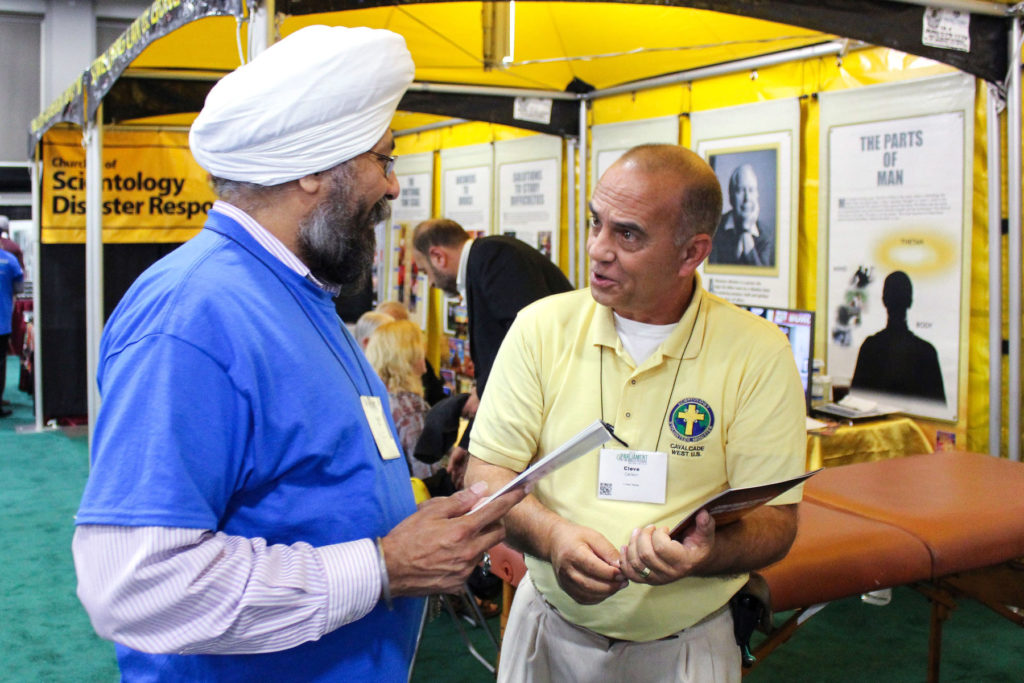According to Hartford International University for Religion and Peace in Connecticut, the international interfaith movement began in 1893. It was then that “religious leaders from around the world met in Chicago for the Parliament of the World’s Religions, which scholars and faith leaders today recognize as the origin of formal interreligious dialogue.”
This presents a different perspective of this year’s celebration of the Parliament’s 130th anniversary in Chicago.
The Church of Scientology supports and participates in these Parliaments and embraces interfaith dialogue as a fundamental belief and activity.
To share the significance of this year’s celebration, we republish a blog written at an earlier Parliament by Vice President of the Church of Scientology European Office of Public Affairs and Human Rights, Rev. Eric Roux, who also moderated a panel at this year’s event.
_____________
Parliament of the World’s Religions, first organized in 1893 in Chicago, was the first major initiative to bring together world religions, Western and Eastern, in one place, and to provide a platform for understanding, meeting and joint action—a completely revolutionary idea at that time.
There exists in France—but not only there—a form of religious illiteracy affecting both nonreligious and religious people, who know very little about faiths apart from their own.
Catholics, Protestants, Hindus (including a historic speech by Swami Vivekananda), Jains, Muslims, Jews, Christian Science faithful, Buddhists, Theosophists, and others came together that first year. In all, more than 5,000 delegates from various world religions were present. Interreligious dialogue on a planetary scale was born.
It was a century before a second Parliament took place. In 1993, at the initiative of disciples of Swami Vivekananda, more than 150 religious leaders gathered again in Chicago and decided to continue the work of mutual understanding and dialogue. To the religions present in 1893 were added the Tibetan Buddhists represented by the Dalai Lama, Sikhs, and various Native American and other indigenous religions.
In 1999, the Parliament was hosted in Cape Town, South Africa, with a special appearance by Mr. Nelson Mandela, followed by Parliaments in 2004 in Barcelona, 2009 in Melbourne, 2015 in Salt Lake City, and 2018 in Toronto, where more than 10,000 met to dialogue and learn about one another’s religions.
…religion can be, above all, a route to spiritual discovery, peace, and deep understanding of others.
The Parliament was an opportunity to meet members of many different religious traditions and learn more about their religions—from Sikhs and Baha’is to a Taiwanese Dharma Master and members of First Nations traditions who shared their vision of the world—and to welcome people of all faiths to the Scientology information booth to answer their questions and forge alliances for common social programs. It was an extraordinary experience.
I had the opportunity to meet the grandson of Mahatma Gandhi, a man of great intelligence and philosophy, and many other exceptional people. I gained even greater respect for the diverse faiths attending, the wealth of similarities and differences among us, and the value of the Parliament.
There exists in France—but not only there—a form of religious illiteracy affecting both nonreligious and religious people, who know very little about faiths apart from their own. The absence of this understanding spawns and perpetuates an impressive number of prejudices, stereotypes, misunderstandings and tensions.
Despite the use of religion over the centuries and even today, to create discord, violence, even atrocities, it must not be forgotten that the source of this is a small minority and that religion can be, above all, a route to spiritual discovery, peace, and deep understanding of others.
_______________
From its beginnings, the Church of Scientology has recognized that freedom of religion is a fundamental human right. In a world where conflicts are often traceable to intolerance of others’ religious beliefs and practices, the Church has, for more than 50 years, made the preservation of religious liberty an overriding concern.
The Church publishes this blog to help create a better understanding of the freedom of religion and belief and provide news on religious freedom and issues affecting this freedom around the world.
The Founder of the Scientology religion is L. Ron Hubbard and Mr. David Miscavige is the religion’s ecclesiastical leader.
For more information, visit the Scientology website or Scientology Network.
Originally published on Scientology Religion.

